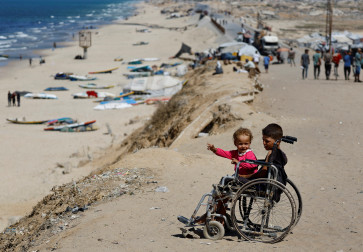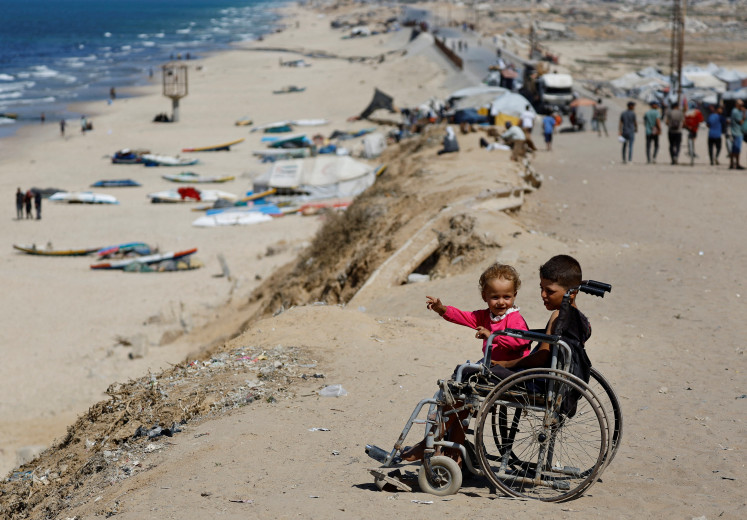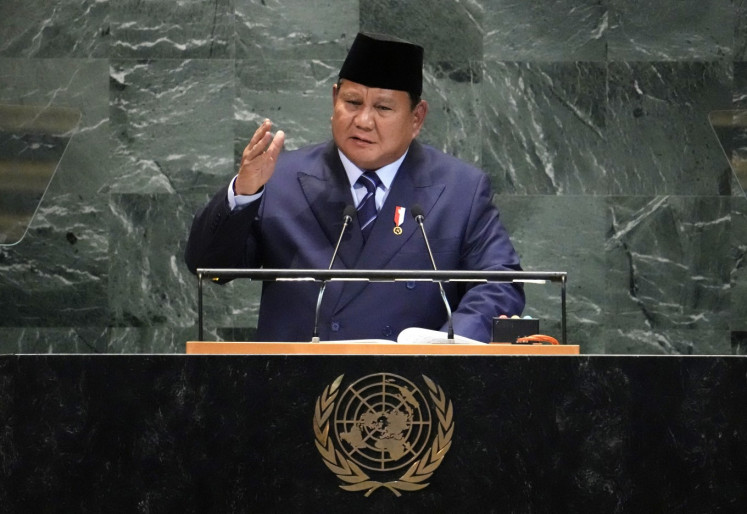Popular Reads
Top Results
Can't find what you're looking for?
View all search resultsPopular Reads
Top Results
Can't find what you're looking for?
View all search resultsSofjan Wanandi in the eyes of friends & relatives
One thing that is unarguable about Sofjan Wanandi is that the student activist-turned-businessman is always straight forward in expressing his views
Change text size
Gift Premium Articles
to Anyone
O
ne thing that is unarguable about Sofjan Wanandi is that the student activist-turned-businessman is always straight forward in expressing his views. Many have been irritated by his sharp words as he has always been to the point in expressing criticism.
Former finance minister Sri Mulyani Indrawati is among those who used to be irritated by Sofjan’s strong words.
“Sofjan’s criticism often sparks pessimism, not encouragement. It seems that there is nothing right from us [officials] and our efforts are always not enough,” says Sri Mulyani, who is now a World Bank managing director, referring to Sofjan’s criticism as chairman of the Indonesian Employers Association (Apindo) of her policy when she was still finance minister.
Sri Mulyani’s remark was stated in a newly published book: Sofjan Wanandi: Aktivis Sejati (Sofjan Wanandi: A true activist). She is among more than 100 figures whose comments are in the book. The 552-page book is edited by Kompas senior journalist Abun Sanda.
The book presents testimonies and views from figures, ranging from his friends of the Angkatan ’66 group of student activists, politicians, businessmen, journalists, scholars and both Indonesian and foreign diplomats.
Interestingly, contributors to the book are not only those with the same views as Sofjan, but also those who are critical of him. Besides Sri Mulyani, senior lawyer
Adnan Buyung Nasution, Todung Mulya Lubis and former speaker of the People’s Consultative Assembly Amien Rais are among the critical contributors in this
book.
For fellow activists of Angkatan ‘66, it is not surprising to hear Sofjan’s strong words and courage. They said that while many ethnic Chinese people opted to hide in their houses for fear of being stigmatized as communists during the 1965 uprising, Sofjan stood in the frontline in criticizing Sukarno’s administration.
Albert Hasibuan, a fellow activist, testified that Sofjan was the one who had the idea to “attack” the Foreign Ministry, which was then led by Soebandrio, a close aide of Sukarno. “What shocked me was that the protest was not a common protest as it used to be, but an attack against the ministry, as the protesters destroyed parts of the building,” Albert recalled.
Other contributors to the book include former vice president Jusuf Kalla, former cabinet ministers Ali Wardhana, Fahmi Idris, Cosmas Batubara, and Sarwono Kusumaatmadja, as well as former Bank Indonesia senior deputy governor Anwar Nasution, President and CEO of US Chamber of Commerce Thomas J. Donohue, Taiwanese Vice President Vincent Siew, former US ambassador to Indonesia Paul Wolfowitz, and Muhammadiyah chairman Din Syamsuddin.
They said Sofjan (frequently referred in the book by his Chinese name, Lim Bian Khoen) never hesitated to criticize anybody who he felt needed to be criticized. He was critical of the governments of Sukarno, Soeharto, B.J. Habibie, Megawati Soekarnoputri and Susilo Bambang Yudhoyono. “Sofjan’s critical stance against the Indonesian presidents proves the quality of his courage,” says Wolfowitz.
The US diplomat also praised Sofjan as a patriot of Indonesia. “In my perspective, Sofjan and his brothers are real patriots… Their commitment to Indonesia is very high,” he said.
Amien shared Wolfowitz’ view. “If I have to be honest, I have no doubt about Sofjan’s nationalism and patriotism.”
In another part of this book, Buyung describes Sofjan’s role in preparing the development concept for Soeharto administration. According to Buyung, it was through the Centre for Strategic and International Stadies (CSIS) that Ali Murtopo, Harry Tjan Silalahi, Cosmas Batubara as well as Sofjan and Jusuf Wanandi played an important role in directing the Indonesian development under Soeharto.
Human rights activist and lawyer Todung tells about Sofjan’s flight to Singapore during the Habibie administration, while other contributors discuss the early rift between Sofjan and Soeharto in late 1980s.
The book also includes testimonies from relatives of Sofjan. An account by Katrina Setiadi, his mother, for example, shows how Sofjan liked to play outdoor games, particularly marbles, and that it was difficult to ask Sofjan to study for school at home. “Upon returning from school and having his meal, he ran away and just returned home in the evening... He was good at playing marbles and always won. He was happy because he got a lot of marbles,” she recalls.
Jusuf, Sofjan’s oldest brother, recalled how their father set a high level of discipline for all of his sons. “If one of the sons made a mistake, all of us got punishment from father,” says Jusuf. “Therefore I always pitied you [Sofjan], the smallest among the first three sons, for also getting punishment because of my or Willem’s [second son] mistake. But it proved that the punishment made you the toughest among us.”
Another side of Sofjan is told by Jusuf Kalla. According to Kalla, Sofjan is a friend in need. “Amid his tough schedule as a businessman, Sofjan wanted to spend his time for weeks to care for his friends who were being hospitalized abroad,” recalls Kalla.
Kalla also said that Sofjan had never changed since he was a student activist in 1966. “Sofjan never stopped being an activist… When he was a student, he was a tough and courageous activist; when he was a noted businessman, he did not change. He was a vocal critic of Soeharto’s New Order government although he had grown to become a prominent businessman during the era.”
It is interesting to read testimonies about Sofjan from his friends and relatives. But there are still many things we need to know about him, particularly about his contribution to the student movement. Therefore, Sofjan may need to consider the suggestion made by Buyung that he write a memoir about his role in the 1966 student movement.
Sofjan Wanandi Aktivis Sejati
(Sofjan Wanandi: A True Activist)
Editor: Abun Sanda
Publisher Kompas, 2011
Pages 552










